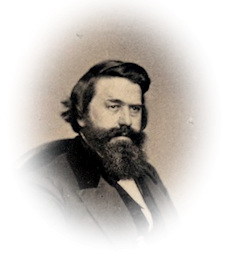“December 8, 1862.
“My dear Sir:
“I have just received a letter from Genl. Johnston which causes gloomy forebodings as to our future in the West. Pemberton, he says, has fallen back before a superior force and he, Johnston, is ordered to reinforce him with troops from Bragg’s command. Consider the position of their different armies. As Pemberton falls back he will be each day one march further from Bragg. Grant is between them, with, I suppose, a superior force to either. If he falls upon either before their junction, may he not destroy him and then turn upon the other? When Bragg crosses the Tennessee river Grant may turn upon him at any moment. How long will it take to cross the Tennessee without Birago trestles or pontoon boats? Before his raid into Kentucky, Bragg was some two or three weeks in effecting a crossing. Holmes, Johnston writes me, has been ordered to reinforce Pemberton, but he does not say with what force. In that movement, it seems to me, lies our only hope of safety. Let me beg you will urge upon Holmes the utmost energy and promptness in his movements. I trust that his whole force has been ordered across. Vicksburg should be the objective point in this campaign. That being safe, as I think it would be, upon the junction of Pemberton and Holmes, the destruction of Grant’s Army should be our next object. Political considerations should weigh nothing in the movement of troops. A distinguished writer upon the art of war, says, that political objective points, if adopted during a campaign, must be in accordance with the principles of strategy, and that when that is not possible, then they should be adjourned till after a decisive victory. When Oldham and Bob Johnston were badgering me for not joining them in insisting that all the troops from the other side of the river should be returned, I told them that if I had control of the army every soldier from Arkansas and Texas should be brought at once to this side so that Bragg might at once crush Buel. The debate was published and I have to see the first man from Texas who does not approve my course. I mention this to show, that those who oppose the concentration of our troops, be it on one side, or the other, of the river, on political grounds, are mistaken as to public opinion. Our people are full of good sense and patriotism, and they will not refuse the means necessary to secure success. Let us save Vicksburg and then crush Rosecranz and then I am indifferent whether you winter the army in Kentucky or Missouri.
“One word more as to the policy to govern in the West. The valley of the Mississippi should be the échequier of operations and the armies of the West should be under one head. On whichever side of the river the enemy appears, he should be met with our whole force, and crushed. If he appears on both sides, concentrate on one, and crush him there, and then cross and crush him again. I trust that the last battle has been fought by us with inferior numbers. Whenever the enemy divides, concentrate and crush; and then ‘follow up the hand,’ as at ten pins when you make a ten strike. I am induced to write you more fully on this subject from a conversation I had with Boteler during my last visit to Richmond in which he was urging the propriety of giving Jackson a separate command. The entire army of Virginia should continue under Lee. I write you freely and unreservedly because I know you will not misunderstand me, nor regard my advice as obtrusive. I would be obliged if you would answer this letter, as I feel great anxiety and uneasiness as to the fate of Pemberton’s Army. I am writing currente calamo and in great haste and beg that you will excuse this scrawl and believe me very truly and sincerely,
“LOUIS T. WIGFALL.
“HON. J. A. SEDDON
“P. S. Have you any information as to the state of things at Fredericksburg? If not, what is your conjecture? Does Burnside simply wish to get into Fredericksburg, claim a great victory à la McClellan and winter there?”
